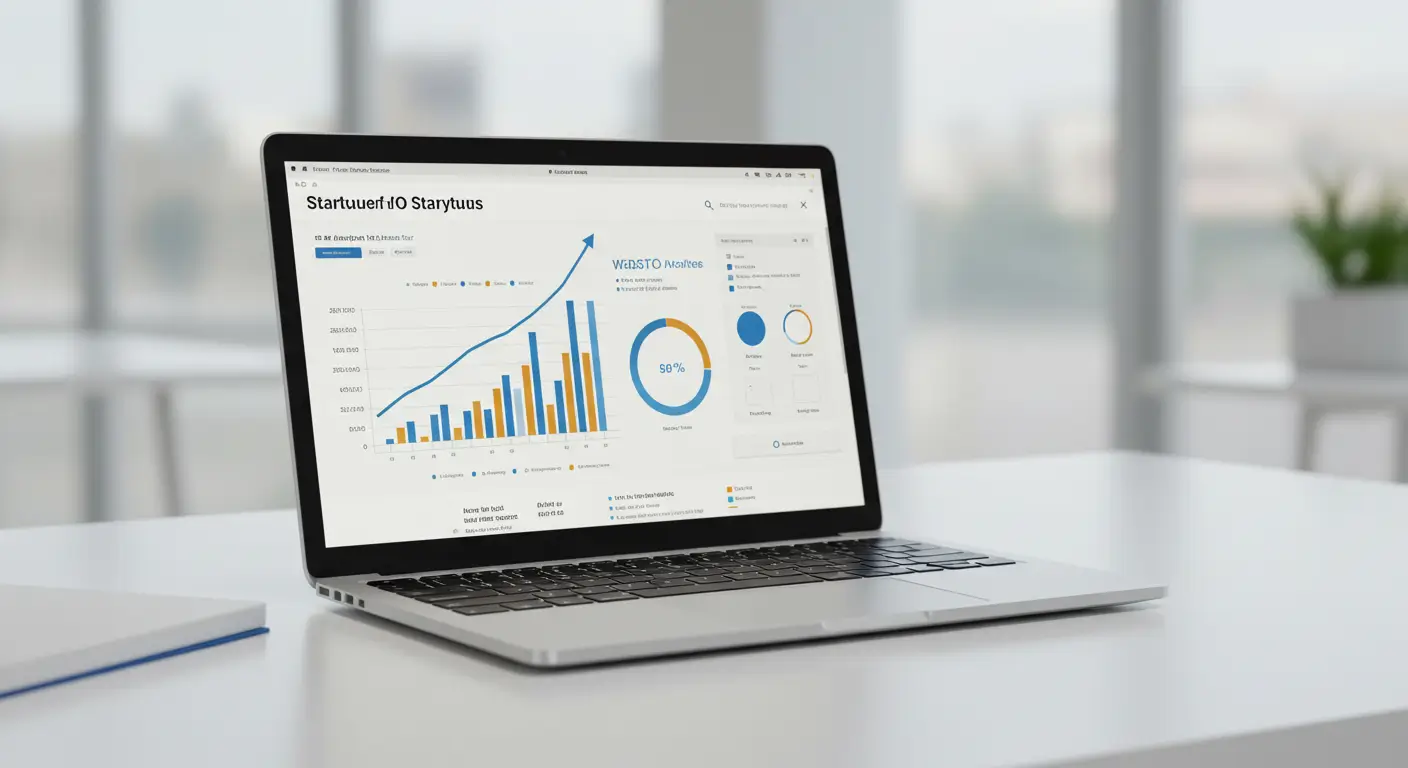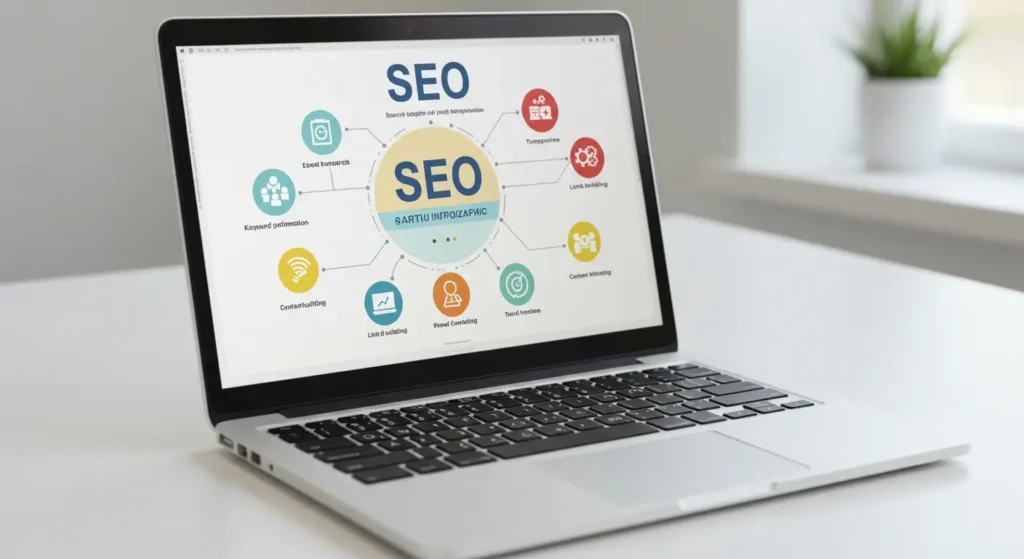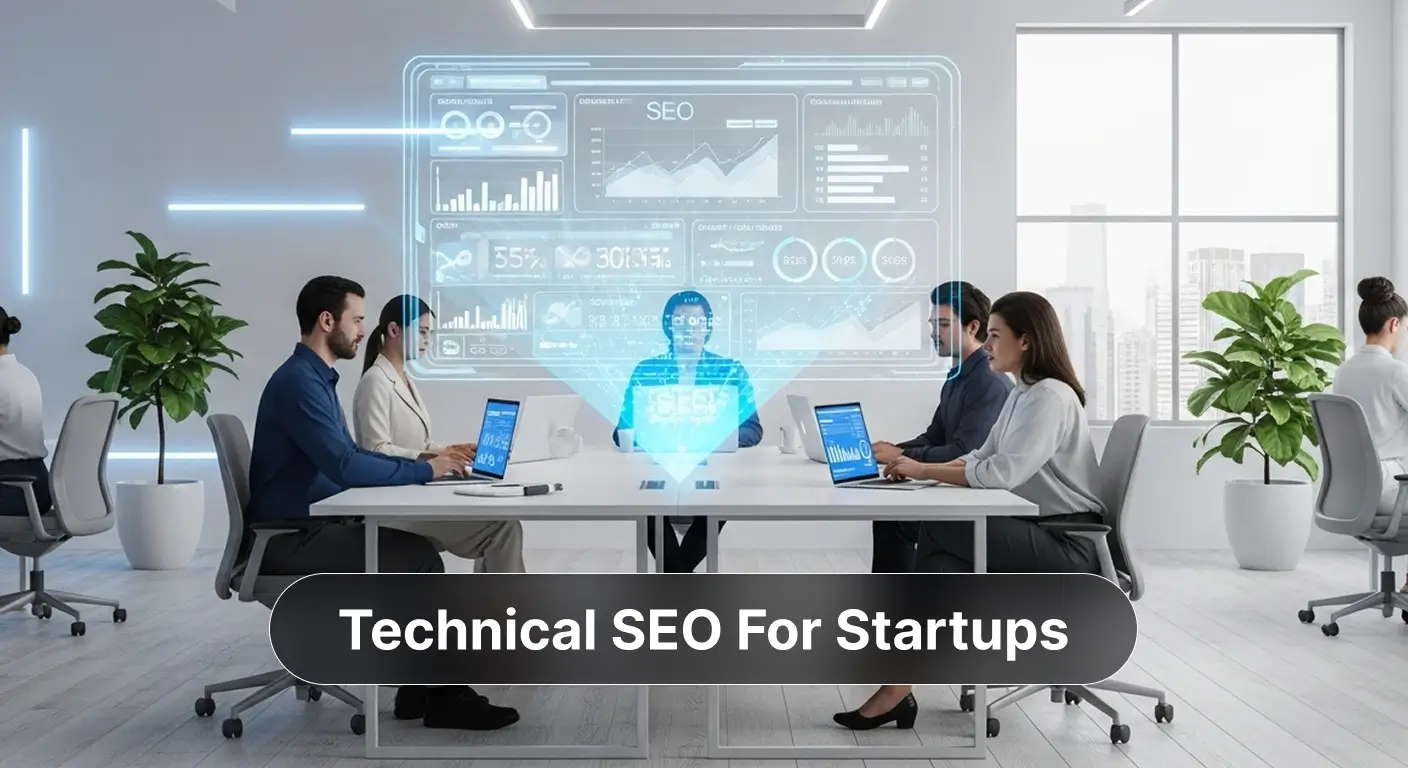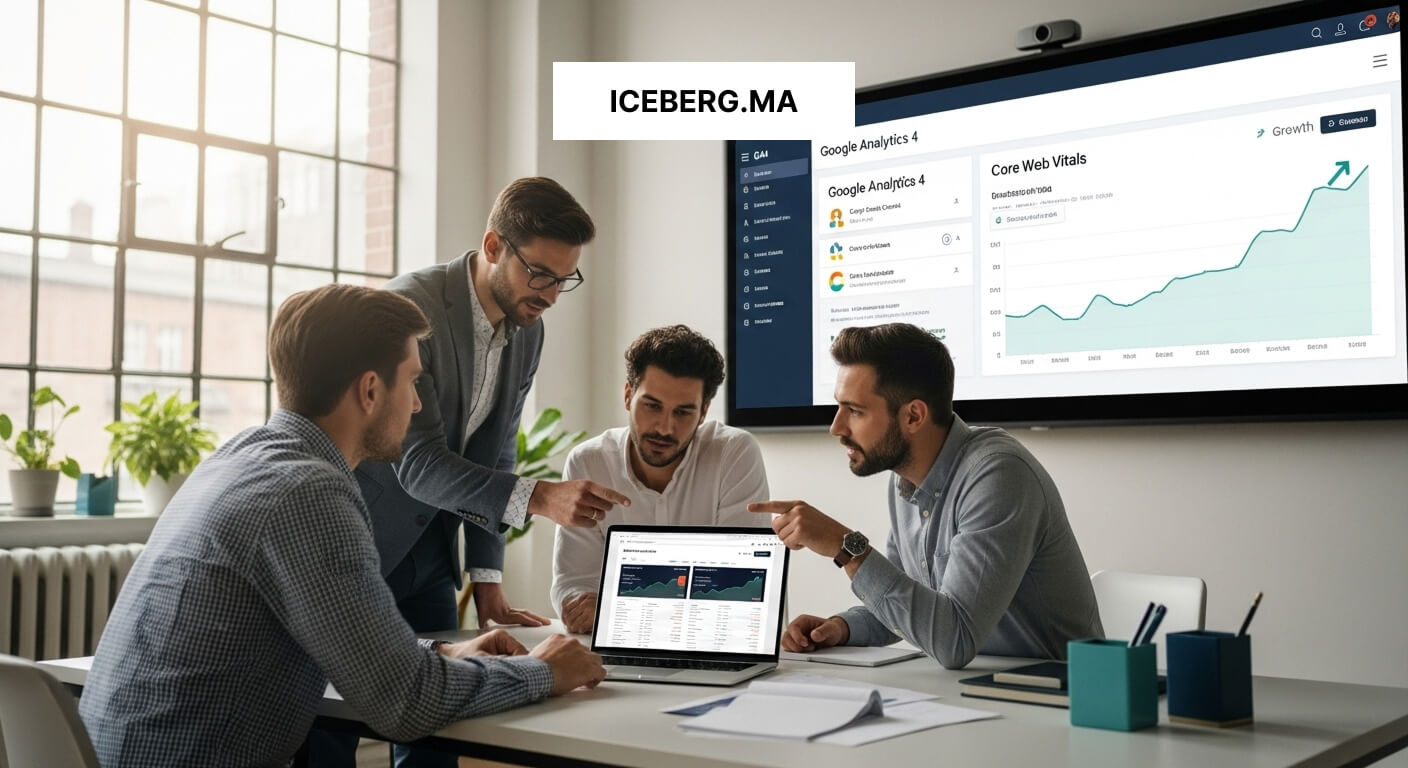
SEO Services for Startups: How to Build Visibility from Day One
Introduction
In today’s digital-first world, launching a startup without a clear visibility strategy is like building a product no one knows exists. That’s where SEO services for startups come in—not as a luxury, but as a growth essential. Whether you’re pre-launch, just went live, or scaling your MVP, getting found online early can make the difference between gaining traction or getting lost in the noise.
At Iceberg, we understand that startups need more than just traffic—they need qualified visibility that converts. This guide breaks down how smart, scalable SEO can help you build authority, attract early adopters, and create a long-term competitive edge, starting from day one.
Let’s dive into what it really takes to make SEO work for your startup—fast.

Why SEO Is a Startup’s Most Powerful Growth Channel
Visibility = Credibility for Startups
When your startup appears on page one of Google, you’re not just being found—you’re being trusted. For early-stage businesses, search visibility often makes the difference between gaining traction or staying invisible. Why? Because people trust what they can find, and they rarely look beyond the first results.
A strong online presence signals that your brand is active, valuable, and solving real problems. This builds instant credibility, especially with early adopters, investors, and even potential team members.
???? Callout Stat:
“75% of users never scroll past the first page of Google.”
(Source: HubSpot)
This stat alone shows why your startup must be discoverable from day one. It’s not just about visibility—it’s about being seen where it counts.
✅ Micro Checklist: Why Visibility Matters
- ✅ Builds trust with customers and partners
- ✅ Attracts investor attention organically
- ✅ Validates product-market fit through search demand
- ✅ Strengthens your long-term brand authority
SEO vs Paid Ads: Which Is Right for Your Stage?
Startups often face a critical growth decision early on: invest in SEO or go for Google Ads? Both can work—but they have very different outcomes over time.
SEO is a long-term investment with compounding benefits, while PPC (Pay-Per-Click) like Google Ads can generate instant traffic—at a cost.
Let’s break it down:
| Factor | SEO | PPC (Google Ads) |
|---|---|---|
| Cost Over Time | Low (after initial setup) | High (ongoing spend) |
| Traffic Longevity | Evergreen & compounding | Immediate, stops when budget ends |
| Trust Factor | High (organic results = credibility) | Lower (clearly marked as ads) |
| Ideal For | Sustainable brand growth | Testing offers, gaining quick data |
???? Growth Strategy Tip:
If your budget allows, combine both. Use PPC to test messaging and landing pages, while your SEO strategy builds a foundation for long-term visibility.
Proof in Performance: Startups That Nailed SEO Early
Let’s look at “FlowScale”—a fictional SaaS startup launched from Casablanca.
FlowScale began with a lean marketing team and zero ad spend. Instead of pouring funds into ads, they created optimized landing pages, startup-focused blog content, and technical documentation indexed by Google.
Within six months, they ranked in the top 3 for keywords like “automated workflow tool for startups” and “no-code process builder.” The organic traffic snowballed, and:
- They hit 15,000+ monthly visitors
- Increased trial signups by 300%
- Caught the attention of a VC firm through search
All without spending a dirham on paid traffic.
✏️ Pro Tip Box
“Start early. SEO is a compounding investment. The sooner you commit, the faster your brand grows—without burning budget.”
Key SEO Services That Fuel Startup Growth
Technical SEO: Your Digital Infrastructure
Before you climb the ranks, you need a rock-solid technical foundation. Think of it as building your startup on reinforced concrete—not sand.
Technical SEO ensures your site is crawlable, fast, mobile-friendly, and ready for search engines to index and rank. It’s what allows Google to understand your site structure and users to enjoy a seamless experience.
✅ Checklist: Your Technical SEO Essentials
- ✅ Mobile-first design (optimize for mobile screens first, desktop second)
- ✅ Clean, lightweight code for fast load speed (Lighthouse score > 90)
- ✅ Indexable structure with sitemap.xml and robots.txt properly configured
- ✅ Fix Core Web Vitals issues (especially CLS and LCP)
- ✅ HTTPS & secure hosting environment
- ✅ Semantic HTML and accessible content for screen readers
Tools like Lighthouse, robots.txt, and sitemap.xml help diagnose and optimize these elements—before you start publishing content.
Strategic Keyword Mapping & Content Clusters
It’s not enough to guess what people search for—you need to map keywords to search intent and build structured clusters that guide users along their journey.
Startups often win by becoming authorities in focused niches. This is where topic clusters come in.
???? Content Funnel Flowchart
plaintextCopyEdit[Awareness Stage] ➝ [Consideration Stage] ➝ [Decision Stage]
"EV market trends" ➝ "Best EV charging options" ➝ "Compare EV chargers for my business"
???? Example Cluster:
- Pillar Topic: EV Charging for Businesses
- Supporting Cluster Pages:
- “Best EV Charger Brands in 2025”
- “How Much Does It Cost to Install EV Charging?”
- “AC vs DC Chargers: What’s Right for Your Business?”
Use tools like Ahrefs, Semrush, or AnswerThePublic to identify search trends, intent patterns, and content gaps.
???? Pro Tip: Use content clusters not just to rank—but to move leads from awareness to action.
On-Page SEO That Converts
On-page SEO is where visibility meets action. It’s not just about ranking—it’s about guiding your users to take the next step, whether it’s a sign-up, a demo, or a purchase.
Optimize for both search engines and humans with conversion-friendly design and structure.
✅ Key On-Page SEO Elements
- Compelling title tags with primary keyword
- Clear content hierarchy (H1 > H2 > H3…)
- Meta descriptions that drive clicks
- Schema markup (especially FAQ & Article)
- Strong internal linking to relevant pages
- Strategic calls to action within blog content
???? Add collapsible FAQ sections using FAQ schema to improve UX and increase your chance of appearing in rich results on Google.
???? CTA Example:
???? Ready to scale your organic traffic? Book your free SEO consultation today
Scaling with Local & Global SEO Tactics
When to Prioritize Local SEO
Not every startup needs global reach—some win big by owning their local scene first. If you’re launching in a specific region or targeting nearby customers, local SEO is a game-changer.
Local SEO helps you show up in “near me” searches, build location-based trust, and convert foot traffic or regional queries into real revenue.
???? Local SEO: Is It Right for You?
- You’re opening a new physical storefront
- Your product/service is tailored to a specific city or region
- You’re a local SaaS or B2B startup looking to gain early traction
✅ Best For:
- Retail or hybrid startups with a physical presence
- Region-specific service providers (e.g., EV charger installers in Casablanca)
- B2B SaaS targeting a particular geographic market
NAP consistency (Name, Address, Phone number) across platforms is essential. Make sure your Google Business Profile is optimized, and gather local citations across trusted directories.
????️ Don’t forget to implement local business schema—it enhances your listings and helps Google match you with hyper-local queries.
Laying Groundwork for Global SEO
If you’re building a scalable product or have international ambitions, don’t wait until later—start building global SEO infrastructure now. Search behaviors vary by language, country, and culture, so your strategy must go beyond translation.
???? Global SEO Readiness Checklist:
- ✅ Use country-specific URLs (e.g.,
/fr/,fr.domain.com, or.fr) - ✅ Apply hreflang tags correctly to signal language & regional targeting
- ✅ Create a translation plan (human + AI-supported for efficiency)
- ✅ Localize content for user intent (not just direct translation)
- ✅ Adapt content offers (pricing, currencies, services) to local norms
- ✅ Use tools like Ahrefs or Semrush to track international keywords
???? Global SEO allows you to scale intelligently, attract international press, and convert diverse audiences into loyal users.
Social Proof & Trust Signals That Boost Rankings
Search engines—and users—trust brands that others vouch for. This is where social proof and E-E-A-T (Experience, Expertise, Authoritativeness, Trust) come into play.
Boosting your rankings isn’t just about content or keywords—it’s about reputation.
???? Key Trust Signals:
- Online reviews (Google Reviews, Trustpilot, etc.)
- High-authority backlinks
- Media mentions & testimonials
- Verified business details
⭐ Example Client Review:
“We tripled our monthly leads in under 3 months thanks to Iceberg’s targeted SEO for our Moroccan-based app launch. Their local-first, scalable approach was the secret sauce.”
— Fatima A., CEO @ StartupX
???? Pro Tip:
Encourage reviews across multiple platforms—Google, Clutch, Trustpilot. More touchpoints = more trust.
???? Ask every satisfied client to leave a quick review—it’s a ranking factor and a conversion booster.
Measuring What Matters in SEO
Understanding what to track in your SEO journey is just as important as execution. For startups, every click, visit, and keyword move should bring clarity to growth.
Let’s dive into the metrics, tools, and common pitfalls that define SEO success—or failure.
Foundational SEO Metrics for Startups
Before you scale, you need to track what drives visibility and engagement. The following core metrics give early-stage startups insight into what’s working and where to optimize.
???? Essential SEO Metrics Table:
| Metric | What It Measures | Why It Matters |
|---|---|---|
| CTR | Click-through rate | Indicates if your title & meta entice clicks |
| Bounce Rate | % who leave after one page | Signals content quality & user experience |
| Keyword Positions | SERP ranking for target terms | Shows progress and opportunity to scale traffic |
| Impressions | Search visibility in Google | Reflects content reach and discoverability |
| Domain Rating | Overall backlink authority | Impacts your ability to rank against competitors |
???? Use Google Analytics 4 (GA4) for behavioral data and Google Search Console (GSC) for search-specific insights.
Tools That Save Time (and Headaches)
When you’re running lean, smart SEO tooling makes all the difference. These platforms help you track, optimize, and scale faster—without burning hours.
????️ Top Tools for SEO Efficiency:
- ???? Ahrefs – Best for backlink monitoring, keyword gaps & competitor tracking
- ???? Semrush – Powerful for keyword research, technical audits & project workflows
- ???? Looker Studio (ex-Data Studio) – Create SEO dashboards and auto-reports from GSC & GA4
- ???? Screaming Frog – Crawl your site to find broken links, missing tags & duplicate issues
- ✍️ Surfer SEO – Analyze and optimize content for on-page SEO and semantic scoring
Each of these can plug into your reporting stack—ideal for agile startups balancing growth and clarity.
SEO Mistakes That Can Set Startups Back
In the rush to get traffic, many startups make critical errors that slow growth or trigger penalties. Here’s what to avoid:
❌ Early-Stage SEO Traps to Watch:
- Targeting keywords with no intent
→ Don’t go after vanity metrics. Focus on keywords aligned with your offer and audience journey. - Ignoring site speed
→ A slow site frustrates users and hurts rankings. Optimize Core Web Vitals from the start. - Buying backlinks
→ Fast wins can lead to penalties. Build relationships, not shortcuts.
???? Remember: Good SEO is a long-term play. Prioritize clean, intent-driven growth over quick hacks.
How to Choose the Right SEO Partner for Your Startup
Choosing the right SEO agency is a pivotal decision for your startup’s growth. You need a partner that understands your goals, your stage, and how to drive sustainable results. Here’s how to evaluate potential SEO partners.
Qualities of a Growth-Driven SEO Agency
Your startup needs more than just an SEO agency—it needs a growth-driven partner. The best agencies aren’t just about ranking for keywords; they focus on long-term, scalable strategies that deliver measurable results.
???? Key Qualities to Look For:
- ???? Agile Process – Startups need flexibility. Your SEO agency should pivot quickly and respond to market shifts.
- ???? Transparent Pricing – Clear pricing helps avoid hidden fees and ensures your ROI stays on track.
- ???? Proven Startup Results – Look for case studies and success stories with companies at your stage. If they’ve helped others scale, they can help you, too.
- ???? Custom SEO Plans – No one-size-fits-all solutions. Your agency should offer personalized strategies based on your unique goals and challenges.
- ???? Scalability – Choose an agency that can scale with your growth. As you expand, they should be able to elevate your SEO efforts without missing a beat.
Questions to Ask Before Signing a Contract
Before committing to an SEO agency, ask the right questions to ensure they’re the perfect fit for your startup.
???? Questions to Ask SEO Agencies:
| Question | What It Reveals |
|---|---|
| “Do you have startup case studies?” | Domain expertise & proven success with startups |
| “How do you measure ROI?” | Data-driven approach and performance metrics |
| “Can we scale our SEO plan?” | Flexibility and growth readiness |
| “What’s your approach to link building?” | Long-term, sustainable link-building strategy |
| “How do you stay updated on SEO trends?” | Commitment to continuous learning & adaptation |
These questions ensure that your SEO partner has the experience and strategy to help your startup grow, not just rank.
Why Iceberg is Built for Startup Success
At Iceberg, we specialize in startup-focused SEO that fuels growth. Our custom plans are designed to boost visibility, attract customers, and scale your business with measurable results.
We don’t just optimize your website—we help you create a strong foundation for long-term success. Our team has worked with a variety of startups, helping them achieve brand discoverability, scale traffic, and convert visitors into customers.
???? Related Resource: Check out our Startup SEO Services: Boost Your Visibility & Grow Fast for more details on how we can help your startup succeed.
???? Ready to scale your visibility? Schedule your free SEO audit now. Let’s start building your growth strategy today!
Conclusion
Choosing the right SEO strategy and partner is crucial for startups looking to achieve sustainable growth. While PPC can provide immediate results, SEO offers a solid foundation for long-term success. By focusing on visibility, local and global reach, and aligning with an SEO agency that understands your startup’s unique needs, you’ll position yourself to scale faster and smarter.
Start early, track metrics, and adapt your strategy as you grow. With the right partner, your startup will not only climb the ranks of search engines but also dominate your market. Ready to make that happen?
???? Schedule your free SEO audit today and start scaling your startup’s visibility!
✅ Bonus Section: FAQs
| Question | Quick Answer |
|---|---|
| How long does SEO take to show results? | 3–6 months for traction; longer for compound growth. |
| Is SEO or PPC better for startups? | SEO is long-term, PPC gives faster data. Ideally, use both. |
| Should I do SEO before product-market fit? | Start foundational work early—especially technical SEO. |


